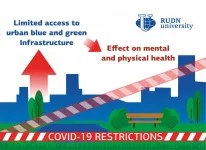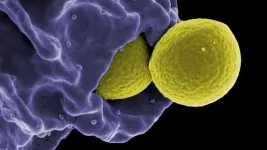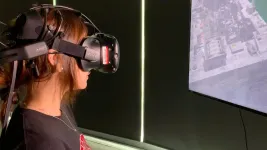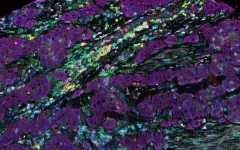Scientists show the importance of contact with nature in the city during the lockdown
2021-07-07
(Press-News.org) The measures taken during the COVID-19 pandemic limited the access of citizens to natural objects. It is still unexplored, what consequences this had for the residents and what conclusions should be drawn for more effective urban planning. RUDN University scientists with colleagues from Australia and Germany studied how the restrictions associated with COVID-19 affected the use of blue and green infrastructure by citizens in Moscow (Russia) and Perth (Australia), and what consequences this had for their health. In the article "Human Dimensions of Urban Blue and Green Infrastructure during a Pandemic. The Case Study of Moscow (Russia) and Perth (Australia)", published in Sustainability, they presented the results of a study on the importance of green and blue infrastructure for the physical and mental health of the citizens. The results give a basis for developing a balanced strategy for landscape design and urban space planning based on the development of green infrastructure that allows effectively maintaining the well-being and health of citizens, especially during a crisis such as that caused by COVID-19.
The significant challenges caused by the COVID-19 pandemic emphasized that the concept and features of the modern environmentally balanced cities development should consider not only the implementation of economic and social urban strategies, but also functional urban design, related to the urban spaces planning and the development of green infrastructure. Using the results of a web questionnaire survey conducted in May-July 2020 in Moscow (Russia) and Perth (Australia), the article presents an analysis of the significance of contact with nature and various objects of green and blue infrastructure of cities, as well as their changes during and after the COVID-19 restrictions. In order to identify the way people relate to green and blue urban objects and what role they play in providing a comfortable environment, as well as how the general restrictions associated with COVID-19 affected the nature of their interaction with natural infrastructure, they developed a questionnaire of 25 questions, which became the basis of an online study.
216 Muscovites and 110 residents of Perth took part in the survey. The results were analysed statistically. The survey data collected during the isolation period provided information about access to green and blue urban spaces, inequalities in access, as well as changes in the development of urban green infrastructure that are necessary from the respondents' point of view. Scientists analysed the social aspects of citizens' perception of natural objects of the urban and emphasized the importance of contact with nature for maintaining physical and mental health, socio-cultural identification, and socialization (the importance of green and blue objects as social and multicultural spaces). In both cities, measures taken during the COVID-19 restricted people's access to green spaces and water bodies, which negatively affected their mental and physical health and well-being. The survey results showed that the quality, functionality, and location of open natural spaces illustrate the inequality in their distribution and accessibility to the population. In some cases, it was noted that residents of certain areas of cities suffered from limited access to natural objects.
"The COVID-19 circumstances, when access to natural urban facilities was limited for millions of people around the world, highlighted that in extraordinary situations, urban nature can play an essential role in contributing to human well-being and shaping human-nature relationships. Studies have confirmed that public green and blue spaces play a key role not only in maintaining a comfortable environmental situation, but also in restoring mental and physical health during and after an emergency. owever, the issues of how these differential impacts could influence future urban development that will make the cities sustainable and resilient towards addressing challenges, such as those associated with the COVID-19 pandemic and climate change, need to be better understood. In this sense, the comparison of experiences from cities in different countries could be very valuable," says Diana Dushkova, PhD, associate professor at the RUDN University and senior researcher at The Helmholtz-Centre for Environmental Research
The researchers compared Moscow and Perth as two cities with different approaches to the organization of natural objects and landscaping strategies. In Moscow, most of the green areas and water bodies are open to public. In Perth, more than half of the city's green infrastructure facilities are located on private territories. It turned out that residents of Perth and Moscow consider access to nature equally important, even though cities differ in size, climatic conditions, and planning approaches. In both cities, more than 60% of residents said that the opportunity of contact with nature is important or extremely important for physical and mental health. Among the main values of contact with nature, citizens noted fresh air (82.9% in Perth and 51.6% in Moscow), a sense of unity with nature (89.5% in Perth and 71.2% in Moscow), the scenic beauty (89.5% in Perth and 71.2% in Moscow). The differences in the responses of residents of the two cities are noticeable in questions that relate to the specifics of the restrictions adopted in the pandemic. Changes in visiting natural spaces before and during the pandemic are especially noticeable in Moscow, where strict restrictions were introduced. 56.9% of Muscovites visited green and water zones less often. In Perth, parks and other natural recreation areas remained open, and 59.4% of residents did not visit urban natural spaces less often, and 26.7% even began to do it even more often.
"Our results showed that urban residents are aware of the value of green and blue spaces and emphasize their important role in maintaining health and well-being, especially during the COVID-19 pandemic. This is new convincing evidence that the issues of accessibility of natural objects and their balanced distribution in urban areas should be considered in the development strategy of a modern city, which considers the new requirements of the modern world in ensuring safe and comfortable life and maintaining human health. In addition, it indicates that access to nature and public rights to use green spaces determine the overall resilience of cities to the crisis. The obtained results obtained provide the basis for further research in the development of modern approaches to landscape design and planning of urban green and water zones and allow us to see how effectively they can ensure and maintain the well-being and health of citizens, especially during a crisis such as that caused by COVID --19," says Diana Dushkova.
INFORMATION:
[Attachments] See images for this press release:

ELSE PRESS RELEASES FROM THIS DATE:
2021-07-07
Bahamian mosquitofish in habitats fragmented by human activity are more willing to explore their environment, more stressed by change and have smaller brain regions associated with fear response than mosquitofish from unaffected habitats. The new study from North Carolina State University shows that these fish have adapted quickly in specific ways to human-driven change, and cautions that environmental restoration projects should understand these changes so as not to damage adapted populations.
The Bahamas mosquitofish is a small, coastal fish species that frequently inhabits tidal creeks - shallow, tidally influenced marine ecosystems. ...
2021-07-07
In 2019, Anaïs Llorens and Athina Tzovara -- one a current, the other a former University of California, Berkeley, postdoctoral scholar at the Helen Wills Neuroscience Institute (HWNI) -- were attending a scientific meeting and pleased that one session, on gender bias in academia, attracted nearly a full house. The problem: The audience of some 300 was almost all women.
Where were the men, they wondered? More than 75% of all tenured faculty in Ph.D. programs around the world are men, making their participation key to solving the problem of gender bias, which negatively impacts the careers, work-life balance and mental health of all women in science, and even more ...
2021-07-07
FOR IMMEDIATE RELEASE
In what turned out to be one of the most important accidents of all time, Scottish bacteriologist Alexander Fleming returned to his laboratory after a vacation in 1928 to find a clear zone surrounding a piece of mold that had infiltrated a petri dish full of Staphylococcus aureus (S. aureus), a common skin bacterium he was growing.
That region of no bacterial growth was the unplanned birth of a medical miracle, penicillin, and would lead to the era of antibiotics. Now, END ...
2021-07-07
When gravitational waves were first detected in 2015 by the advanced Laser Interferometer Gravitational-Wave Observatory (LIGO), they sent a ripple through the scientific community, as they confirmed another of Einstein's theories and marked the birth of gravitational wave astronomy. Five years later, numerous gravitational wave sources have been detected, including the first observation of two colliding neutron stars in gravitational and electromagnetic waves.
As LIGO and its international partners continue to upgrade their detectors' sensitivity to gravitational waves, they will be able to probe a larger volume of the universe, thereby making the detection ...
2021-07-07
As the COVID-19 pandemic wanes in the U.S., a new study from the University of Maryland School of Medicine (UMSOM) and University of Maryland Medical Center (UMMC) finds that hospitals nationwide may not be adequately prepared for the next pandemic. A 10-year analysis of hospitals' preparedness for pandemics and other mass casualty events found only marginal improvements in a measurement to assess preparedness during the years leading up to the COVID-19 pandemic. The study was published last month in the Journal of Healthcare Management.
"Our work links objective healthcare data to a hospital score that ...
2021-07-07
If a virtual world has ever left you feeling nauseous or disorientated, you're familiar with cybersickness, and you're hardly alone. The intensity of virtual reality (VR)--whether that's standing on the edge of a waterfall in Yosemite or engaging in tank combat with your friends--creates a stomach-churning challenge for 30-80% of users.
In a first-of-its kind study, researchers at the University of Maryland recorded VR users' brain activity using electroencephalography (EEG) to better understand and work toward solutions to prevent cybersickness. The research was conducted by Eric Krokos, who received his Ph.D. in computer science in 2018, and Amitabh Varshney, a professor of computer science ...
2021-07-07
Although wastewater disposal has been the primary driving force behind increased earthquake activity in southern Kansas since 2013, a new study concludes that the disposal has not significantly changed the orientation of stress in the Earth's crust in the region.
Activities like wastewater disposal can alter pore pressure, shape and size within rock layers, in ways that cause nearby faults to fail during an earthquake. These effects are thought to be behind most recent induced earthquakes in the central and eastern United States.
It is possible, however, that human activity could also lead to earthquakes by altering the orientation of stresses that act on faults in the region, said U.S. Geological Survey seismologist ...
2021-07-07
As more evidence emerges that opioid overdose deaths have increased dramatically since the onset of COVID-19, the Centre for Addiction and Mental Health (CAMH), in collaboration with subject matter experts and medical regulatory authorities across Canada, have now released updated national clinical guidelines for the treatment of opioid use disorder. END ...
2021-07-07
When someone is suspected of criminal activity, one of the most important questions they are asked is if they have a credible alibi. Playing back past events in our minds, however, is not like playing back a video recording. Recollections of locations, dates, and companions can become muddled with the passage of time. If a suspect's memories are out of line with documented events, a once-plausible alibi can crumble and may be seen as evidence of guilt.
To put people's memories of past whereabouts to the test, a team of researchers tracked the locations of 51 volunteers for one month and found that their recollections were wrong approximately 36% of the time.
"This is the first study to examine memory for where ...
2021-07-07
Uppsala University scientists have designed a new mouse model that facilitates study of factors contributing to the progression of human bladder cancer and of immune-system activation when the tumour is growing. Using this model, they have been able to study how proteins change before, while and after a tumour develops in the bladder wall. The study has now been published in the scientific journal PLOS ONE.
"The model was designed both to contain specific oncogenes, as they're called -- mutations that can drive tumour growth -- and to show a high incidence of harmful mutations, which we often see in people who get bladder cancer. These harmful mutations arise because of smoking, for instance, which is ...
LAST 30 PRESS RELEASES:
[Press-News.org] Scientists show the importance of contact with nature in the city during the lockdown




